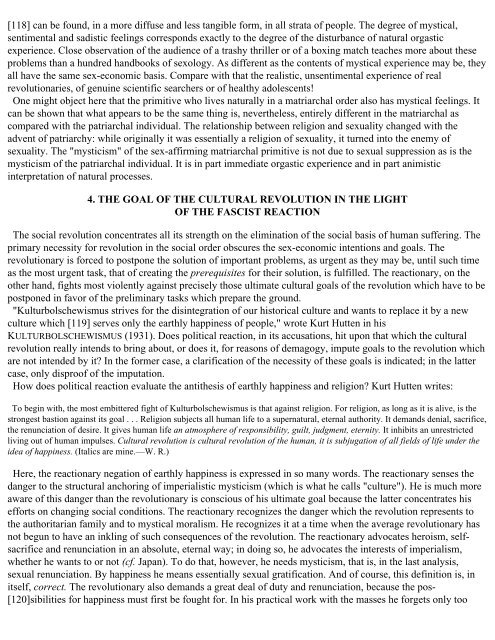The Mass Psychology of Fascism - Anxiety Depression Self-Help
The Mass Psychology of Fascism - Anxiety Depression Self-Help
The Mass Psychology of Fascism - Anxiety Depression Self-Help
You also want an ePaper? Increase the reach of your titles
YUMPU automatically turns print PDFs into web optimized ePapers that Google loves.
[118] can be found, in a more diffuse and less tangible form, in all strata <strong>of</strong> people. <strong>The</strong> degree <strong>of</strong> mystical,<br />
sentimental and sadistic feelings corresponds exactly to the degree <strong>of</strong> the disturbance <strong>of</strong> natural orgastic<br />
experience. Close observation <strong>of</strong> the audience <strong>of</strong> a trashy thriller or <strong>of</strong> a boxing match teaches more about these<br />
problems than a hundred handbooks <strong>of</strong> sexology. As different as the contents <strong>of</strong> mystical experience may be, they<br />
all have the same sex-economic basis. Compare with that the realistic, unsentimental experience <strong>of</strong> real<br />
revolutionaries, <strong>of</strong> genuine scientific searchers or <strong>of</strong> healthy adolescents!<br />
One might object here that the primitive who lives naturally in a matriarchal order also has mystical feelings. It<br />
can be shown that what appears to be the same thing is, nevertheless, entirely different in the matriarchal as<br />
compared with the patriarchal individual. <strong>The</strong> relationship between religion and sexuality changed with the<br />
advent <strong>of</strong> patriarchy: while originally it was essentially a religion <strong>of</strong> sexuality, it turned into the enemy <strong>of</strong><br />
sexuality. <strong>The</strong> "mysticism" <strong>of</strong> the sex-affirming matriarchal primitive is not due to sexual suppression as is the<br />
mysticism <strong>of</strong> the patriarchal individual. It is in part immediate orgastic experience and in part animistic<br />
interpretation <strong>of</strong> natural processes.<br />
4. THE GOAL OF THE CULTURAL REVOLUTION IN THE LIGHT<br />
OF THE FASCIST REACTION<br />
<strong>The</strong> social revolution concentrates all its strength on the elimination <strong>of</strong> the social basis <strong>of</strong> human suffering. <strong>The</strong><br />
primary necessity for revolution in the social order obscures the sex-economic intentions and goals. <strong>The</strong><br />
revolutionary is forced to postpone the solution <strong>of</strong> important problems, as urgent as they may be, until such time<br />
as the most urgent task, that <strong>of</strong> creating the prerequisites for their solution, is fulfilled. <strong>The</strong> reactionary, on the<br />
other hand, fights most violently against precisely those ultimate cultural goals <strong>of</strong> the revolution which have to be<br />
postponed in favor <strong>of</strong> the preliminary tasks which prepare the ground.<br />
"Kulturbolschewismus strives for the disintegration <strong>of</strong> our historical culture and wants to replace it by a new<br />
culture which [119] serves only the earthly happiness <strong>of</strong> people," wrote Kurt Hutten in his<br />
KULTURBOLSCHEWISMUS (1931). Does political reaction, in its accusations, hit upon that which the cultural<br />
revolution really intends to bring about, or does it, for reasons <strong>of</strong> demagogy, impute goals to the revolution which<br />
are not intended by it? In the former case, a clarification <strong>of</strong> the necessity <strong>of</strong> these goals is indicated; in the latter<br />
case, only dispro<strong>of</strong> <strong>of</strong> the imputation.<br />
How does political reaction evaluate the antithesis <strong>of</strong> earthly happiness and religion? Kurt Hutten writes:<br />
To begin with, the most embittered fight <strong>of</strong> Kulturbolschewismus is that against religion. For religion, as long as it is alive, is the<br />
strongest bastion against its goal . . . Religion subjects all human life to a supernatural, eternal authority. It demands denial, sacrifice,<br />
the renunciation <strong>of</strong> desire. It gives human life an atmosphere <strong>of</strong> responsibility, guilt, judgment, eternity. It inhibits an unrestricted<br />
living out <strong>of</strong> human impulses. Cultural revolution is cultural revolution <strong>of</strong> the human, it is subjugation <strong>of</strong> all fields <strong>of</strong> life under the<br />
idea <strong>of</strong> happiness. (Italics are mine.—W. R.)<br />
Here, the reactionary negation <strong>of</strong> earthly happiness is expressed in so many words. <strong>The</strong> reactionary senses the<br />
danger to the structural anchoring <strong>of</strong> imperialistic mysticism (which is what he calls "culture"). He is much more<br />
aware <strong>of</strong> this danger than the revolutionary is conscious <strong>of</strong> his ultimate goal because the latter concentrates his<br />
efforts on changing social conditions. <strong>The</strong> reactionary recognizes the danger which the revolution represents to<br />
the authoritarian family and to mystical moralism. He recognizes it at a time when the average revolutionary has<br />
not begun to have an inkling <strong>of</strong> such consequences <strong>of</strong> the revolution. <strong>The</strong> reactionary advocates heroism, selfsacrifice<br />
and renunciation in an absolute, eternal way; in doing so, he advocates the interests <strong>of</strong> imperialism,<br />
whether he wants to or not (cf. Japan). To do that, however, he needs mysticism, that is, in the last analysis,<br />
sexual renunciation. By happiness he means essentially sexual gratification. And <strong>of</strong> course, this definition is, in<br />
itself, correct. <strong>The</strong> revolutionary also demands a great deal <strong>of</strong> duty and renunciation, because the pos-<br />
[120]sibilities for happiness must first be fought for. In his practical work with the masses he forgets only too


